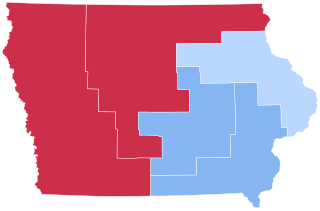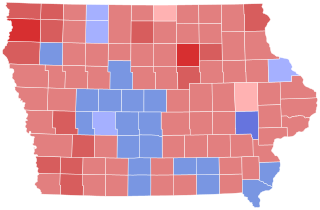
Joseph Sill Clark Jr. was an American writer,lawyer and politician. A member of the Democratic Party,he served as the 90th Mayor of Philadelphia from 1952 to 1956 and as a United States Senator from Pennsylvania from 1957 to 1969. Clark was the only Unitarian Universalist elected to a major office in Pennsylvania in the modern era.

The 1996 United States Senate elections were held on November 5,with the 33 seats of Class 2 contested in regular elections. Special elections were also held to fill vacancies. They coincided with the presidential election of the same year,in which Democrat Bill Clinton was re-elected president.

The 1984 United States Senate elections were held on November 6,with the 33 seats of Class 2 contested in regular elections. They coincided with the landslide re-election of President Ronald Reagan in the presidential election. In spite of the lopsided presidential race,Reagan's Republican Party suffered a net loss of two Senate seats to the Democrats,although it retained control of the Senate with a reduced 53-47 majority. Democrats defeated incumbents in Illinois and Iowa,and won an open seat in Tennessee,while Republicans defeated an incumbent in Kentucky.

The 1980 United States Senate elections were held on November 4,coinciding with Ronald Reagan's victory in the presidential election. The 34 Senate seats of Class 3 were contested in regular elections. Reagan's large margin of victory over incumbent Jimmy Carter gave a huge boost to Republican Senate candidates,allowing them to flip 12 Democratic seats and win control of the chamber for the first time since the end of the 83rd Congress in January 1955.

The 1978 United States Senate elections were held on November 7,in the middle of Democratic President Jimmy Carter's term. The 33 seats of Class 2 were contested in regular elections. Special elections were also held to fill vacancies. Thirteen seats changed hands between parties,resulting in a net gain of three seats for the Republicans. Democrats nevertheless retained a 58–41 majority.

The 1976 United States Senate elections was an election for the United States Senate. Held on November 2,the 33 seats of Class 1 were contested in regular elections. They coincided with Democrat Jimmy Carter's presidential election and the United States Bicentennial celebration. Although almost half of the seats decided in this election changed parties,Carter's narrow victory did not provide coattails for the Democratic Party.

The 1972 United States Senate elections were held on November 7,with the 33 seats of Class 2 contested in regular elections. They coincided with the landslide re-election of Republican President Richard Nixon. Despite Nixon's landslide victory,Democrats increased their majority by two seats. The Democrats picked up open seats in Kentucky and South Dakota,and defeated four incumbent senators:Gordon Allott of Colorado,J. Caleb Boggs of Delaware,Jack Miller of Iowa,and Margaret Chase Smith of Maine. The Republicans picked up open seats in New Mexico,North Carolina,and Oklahoma,and defeated one incumbent,William B. Spong Jr. of Virginia.

John Chester Culver was an American politician,writer and lawyer who was elected to both the United States House of Representatives (1965–1975) and United States Senate (1975–1981) from Iowa. A member of the Democratic Party,his son Chet Culver served as the 41st Governor of Iowa (2007–2011).

Roger William Jepsen was an American politician from the state of Iowa. A Republican,he served in the United States Senate and as Lieutenant Governor of Iowa.
The Iowa Democratic Party (IDP) is the affiliate of the Democratic Party in the U.S. state of Iowa.

The Republican Party of Iowa (RPI) is the affiliate of the United States Republican Party in Iowa. The State Central Committee is chaired by Jeff Kaufmann. The RPI operates the Republican side of the Iowa caucuses and previously sponsored the Iowa Straw Poll.

Lloyd Thurston was a seven-term Republican U.S. Representative from southern Iowa. First elected in 1924,he served until 1938,when he unsuccessfully sought election to the U.S. Senate. By his final term,he had served on three of the most powerful House committees.

Randall Lee Feenstra is an American politician and businessman serving as the U.S. representative for Iowa's 4th congressional district. The district covers the western border of the state,including Sioux City and Council Bluffs,but stretches as far east as Story County,Franklin County,and Marshall County,including Ames.

The 1890–91 United States Senate elections were held on various dates in various states. As these U.S. Senate elections were prior to the ratification of the Seventeenth Amendment in 1913,senators were chosen by state legislatures. Senators were elected over a wide range of time throughout 1890 and 1891,and a seat may have been filled months late or remained vacant due to legislative deadlock. In these elections,terms were up for the senators in Class 3.

The 2010 House elections in Iowa occurred on November 2,2010 and elected the members of the State of Iowa's delegation to the United States House of Representatives. Representatives are elected for two-year terms;those elected served in the 112th Congress from January 3,2011 until January 3,2013. Iowa has five seats in the House,apportioned according to the 2000 United States Census.

The 2014 United States Senate election in Iowa was held on November 4,2014. Incumbent Democratic Senator Tom Harkin did not run for reelection to a sixth term in office.

The 2016 United States Senate election in Iowa was held November 8,2016,to elect a member of the United States Senate to represent the State of Iowa,concurrently with the 2016 U.S. presidential election,as well as other elections to the United States Senate in other states and elections to the United States House of Representatives and various state and local elections.

The 1924 United States Senate election in Iowa took place on November 4,1924. Incumbent Republican Senator Smith W. Brookhart ran for re-election to a full term in office against Democrat Daniel F. Steck.

The 1978 United States Senate election in Iowa took place on November 7,1978. Incumbent Democratic Senator Dick Clark ran for re-election to a second term but was defeated by Republican former Lieutenant Governor Roger Jepsen. This was the last time until 2014 that a Republican would win Iowa's class 2 Senate seat.

Mariannette Jane Miller-Meeks is an American physician and politician serving as a U.S. representative since 2021,representing Iowa's 1st congressional district. Her district,numbered as the 2nd district in her first term,includes most of Iowa's southeastern quadrant,including Davenport,Bettendorf,Burlington,and Iowa City. A member of the Republican Party,Miller-Meeks served as Iowa state senator for the 41st district from 2019 to 2021.





















